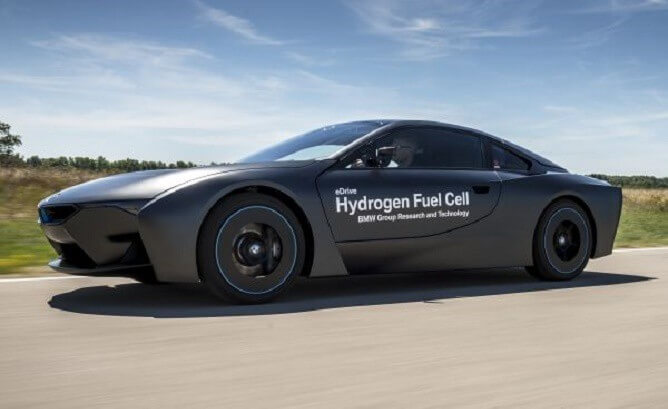Some experts think electric vehicles (EVs) are just one step on the way to hydrogen vehicles. While EVs take a long time to refuel and battery production is energy intensive, hydrogen can be produced from renewable sources and vehicles refuelled rapidly. If the intention is to move away from petrol and diesel, then different types of EV may even co-exist.
The language of EVs can be confusing. While EV refers to a fully electric vehicle, other types of vehicle use electricity to some extent. There are plug-in EVs and battery EVs, regular hybrids, plug-in hybrids and mild hybrids, and fuel cell EVs. With such a diversity, it is no wonder most carmakers are wary of hydrogen.
Stance of carmakers
A vehicle run on hydrogen is usually called a fuel cell electric vehicle (FCEV). This is because liquid hydrogen is converted into electrical energy in a fuel cell. An FCEV stores liquid hydrogen but an EV uses batteries.
Hyundai was the first manufacturer to commercialise FCEVs and seems the most committed to hydrogen. In Australia recently, it reserved the name Neptune, possibly the brand it intends to use for its plan to make half a million FCEVs a year by 2030. Hyundai is not the only one. Great Wall Motor is investing over US$149 million in research and development of FCEVs.
However, certain automakers are cold on the idea. Mercedes has put its fuel cell car project on hold. BMW is working on the iNEXT hydrogen concept car but has no plans to bring it to market and VW says it has no plans to adopt hydrogen at all.
Automakers may understandably be more focused on their immediate concerns, including Covid19, falling sales, strict fuels emissions standards and connectivity.
How hydrogen compares with pure electric
FCEVs compare well with EVs but suffer the usual downsides of any new technology – high upfront costs, lack of infrastructure, limited choice.
| EVs | FCEVs | |
| Current sales | 2 million in 2019 | Very few |
| Charging infrastructure | Widely available | Sparse network |
| Choice | Wide, sedans and SUVs | Very little |
| Affordability | Improving | Very expensive |
| Range | Poor compared to fuel | Good |
| Charge time | Slow | Fast, like fuel with more energy capacity |
| Production | Batteries unsustainable | More sustainable |
| Cost to make | Coming down | Still very expensive |
| Technology | Proven | Available |
| Recycling | Batteries cannot be recycled easily | Power stacks refurbishable, 95% recyclable |
The future of hydrogen
However, there are tentative moves towards hydrogen in Australia. State governments are aiming to work with industry to create ‘hydrogen hubs’ in certain geographical areas to lower hydrogen supply costs. This will help hydrogen compete with existing fuel sources.
For example, a renewable hydrogen facility in Brisbane will be developed by BOC to supply a refuelling station for Qld University of Technology’s campus by mid-2020. Another example is Australian company, H2X, which will manufacture hydrogen vehicles in Port Kembla.
Hydrogen vehicles might start off in the commercial sector first. They can usefully replace diesel trucks, buses and large SUVs because EVs have too many batteries and charging times are too long to be cost effective.
Early days
It is still early days for hydrogen. Analysts LMC Automotive forecast FCEVs will get going around 2035 when renewable energy is more developed. They expect petrol/diesel cars to still make up half of vehicles worldwide by 2030 and 10% by 2050. Meanwhile, IHS Markit expects little FCEV activity before 2030, with about half a million FCEVs a year by 2032. They forecast 70% of vehicles by 2030 will be petrol/diesel or mild hybrid worldwide.
Perhaps the wide choice of alternative drivetrains dilutes the influence of any one of them. It used to be so simple to choose between petrol or diesel. Now, even if a buyer chooses a particular drivetrain, it may not be available in their favourite make and model.


your opinion matters: